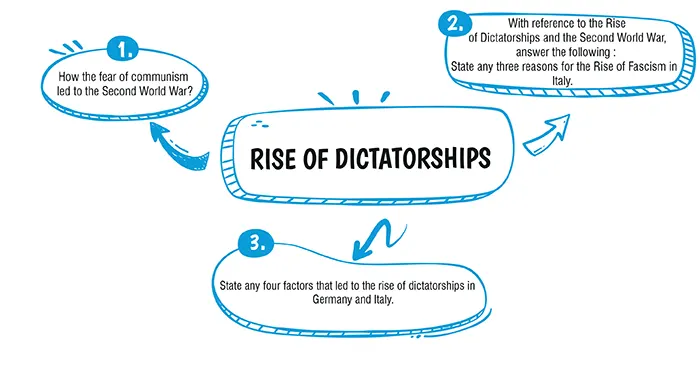Home / Board / ICSE / important Questions / Class 10 / History & Civics / Rise of Dictatorships
Table of Contents

Ans. (d) All of the above
Explanation:
The Treaty of Versailles is considered humiliating because it imposed heavy war penalties on Germany, made her surrender large chunks of her territories like Saar, Rhineland, Ruhr area, some parts of her foreign colonies, prohibited Germany from re-arming herself, and disbanded the German army beyond a limit of one lakh soldiers.
Ans. (d) All of the above
Explanation:
Following are important characteristic features of Hitler’s Domestic Policy:
Explanation:
Fear of Communism in the West : All those countries who had weak governments and were facing various economic problems turned towards Communism. There was a fear in the minds of the governments of Western Capitalist Countries (Britain, France and USA) that Communism would spread in their territories. Germany, Italy and Japan took full advantage of this fear and claimed that they were fighting against communism. These western powers adopted a policy of appeasement which strengthened the Fascist Powers and resulted in the Second World War.
Explanation:
Reasons for the Rise of Fascism in Italy :
1. Dissatisfaction with the Treaty of Versailles: Italy joined the War on the side of the Allies. Among Italians, the feeling was that they had won the War but lost the Peace. Italy had much to contribute to the success of the Allies in the War. But she could have no valuable addition to her territory. When it came to dividing the spoils of War, her allies deserted her.
2. Economic Factors: Economic condition in Italy after the War was very bad. War debts and budget deficits caused lots of difficulty. Everyone in the country felt the pinch of post-war inflation. There was widespread unemployment in the country which led to agrarian riots and strikes.
3. Political Instability and Inefficient and Corrupt Democratic Governments : The post-war democratic governments in Italy were weak; they could not respond properly to the needs and aspirations of the people. The governments under Nitti and Giolitti in Italy were unable to control industrial and agrarian disorders. Popular discontent took the form of strikes and riots.
Explanation:
The four factors that led to the dictatorships in Germany and Italy were :
(i) Dissatisfaction of the Peace Treaties : Italy joined the First World War on the side of the Allies. Mussolini and for that matter the whole of Italy was dissatisfied with the compensation granted to Italy after the war. Similarly Germans felt discriminated against by the Treaty of Versailles. A large chunk of its occupied territory was taken away and shared by other European powers. Military sanctions were imposed. Adolf Hitler blamed the democratic government for this.
(ii) Economic Factors : Economic conditions in Italy after the war were very bad, war debts and budget deficit caused lots of difficulty. The salaried employees, the farmers and the industrial workers felt the pinch post-war inflation. Additionally, heavy war penalties were imposed on Germany which made economic recovery impossible and resulted in high rate inflation and unemployment. Nazi ranks swelled by unemployed youth.
(iii) Inefficient and Corrupt Democratic Government : The post-war democratic Governments were weak. They could not respond properly to the needs and aspirations of the people. Short Lived coalition governments in Italy were unable to tackle the problem faced by the people in their day to day life. Similar was the political scenario in Germany where the Weimar Republic failed miserably to tackle economic downfall and ensuing riots.
(iv) Rise of Totalitarian Ideology : In Italy, there rose a strong feeling for a strong leader with absolute powers to restore peace and economic stability in Germany highlighting the threat of a communist takeover. Hitler was successful in convincing the people that only Nazism could provide a stable economically viable alternative.
Download Mind Map of this chapter
Download NowWant to Practice Mock Tests of this chapter
Practice NowDownload Important Questions of this chapter
Download NowAns: The Treaty imposed harsh penalties on Germany, causing economic hardship and national humiliation, which Hitler and the Nazi Party capitalised on to rise to power.
Ans: People often supported such dictators due to charismatic leadership, promises of economic recovery, nationalistic appeals, and propaganda that blamed societal problems on specific scapegoats, such as Jews or communists.
Ans: Economic crises often led to high unemployment and poverty, making people desperate for change and more receptive to radical political movements that promised stability and improvement.
CBSE Important Questions Class 10
ICSE Important Questions Class 10
CBSE Important Questions Class 10
ICSE Important Questions Class 10